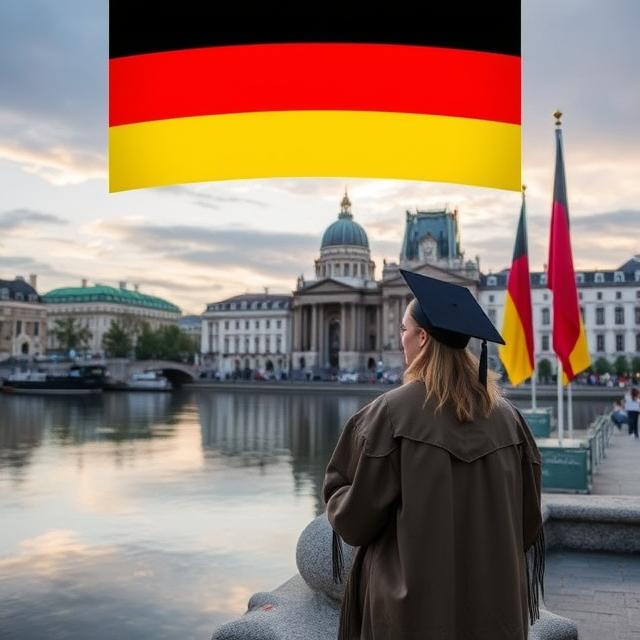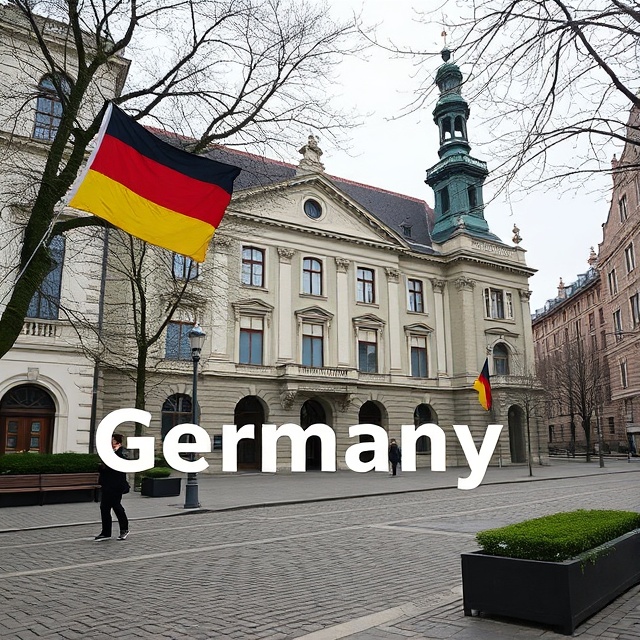Top 10 Scholarships in Germany for PhD Researchers in 2025: Your Gateway to Academic Excellence
Germany, a powerhouse of research and innovation, consistently attracts ambitious PhD candidates from across the globe. Renowned for its world-class universities, cutting-edge research facilities, and supportive academic environment, Germany offers a fertile ground for doctoral studies. However, pursuing a PhD can be financially demanding. Fortunately, a plethora of scholarships are available to support international researchers in their academic journey. This article unveils the top 10 scholarships in Germany for PhD researchers in 2025, providing a comprehensive overview to help you navigate the application process and secure the funding needed to excel in your chosen field.
1. The German Academic Exchange Service (DAAD) Scholarships:
The DAAD (Deutscher Akademischer Austauschdienst), or German Academic Exchange Service, is the leading organization promoting international academic cooperation. DAAD scholarships are arguably the most popular and prestigious options for international students seeking to pursue a PhD in Germany. They offer a wide range of programs tailored to different academic levels and fields of study.
-
DAAD Research Grants – Doctoral Programmes in Germany: This program provides financial support to international graduates seeking to pursue doctoral degrees at German universities. It includes a monthly stipend, travel allowance, health insurance, and potential research allowances. The scholarship duration typically ranges from 12 to 48 months, depending on the length of the PhD program. (Website: https://www.daad.de/en/study-and-research-in-germany/scholarships/)
-
DAAD Graduate School Scholarship Programme (GSSP): This specific program is designed for structured doctoral programs or graduate schools in Germany. It provides funding for outstanding international graduates to participate in these specialized programs, often with a focus on interdisciplinary research. The scholarship benefits are similar to the general DAAD Research Grants. (Specific details can be found on the DAAD website under structured doctoral programs.)
-
DAAD PRIME – Postdoctoral Researchers International Mobility Experience: While not directly for initial PhD funding, PRIME is crucial to mention. Many PhD graduates seek postdoctoral opportunities immediately after their doctorate. PRIME allows German researchers to conduct research abroad, and conversely, allows foreign researchers to conduct research in Germany at a German institution. While technically postdoctoral, planning can begin during the final year of a PhD. (Website: https://www.daad.de/en/information-services-for-higher-education-institutions/funding-programmes/mobility-funding/prime/)
Key Benefits of DAAD Scholarships:
- Generous Monthly Stipend: Covers living expenses effectively.
- Comprehensive Insurance: Health, accident, and liability insurance included.
- Travel Allowance: Covers travel costs to and from Germany.
- Research Allowance: Provides funding for research-related expenses.
- German Language Course: Offers the opportunity to improve German language skills.
2. Helmholtz Association Doctoral Researcher Positions:
The Helmholtz Association is Germany’s largest scientific organization, comprising 18 research centers across the country. These centers conduct cutting-edge research in fields such as energy, earth and environment, health, key technologies, matter, aeronautics, space and transport. Helmholtz centers often offer funded PhD positions within their research groups. These positions are typically structured as employment contracts rather than scholarships, providing a salary and benefits package. (Website: https://www.helmholtz.de/en/career/doctoral-researchers/)
Key Features of Helmholtz Doctoral Positions:
- Salaried Positions: Provide a regular income and benefits.
- Cutting-Edge Research: Opportunity to work on impactful research projects.
- Excellent Infrastructure: Access to state-of-the-art research facilities.
- Mentorship and Support: Guidance from experienced researchers.
3. Max Planck Society PhD Positions:
The Max Planck Society is another leading research organization in Germany, known for its outstanding basic research in various scientific disciplines. Max Planck Institutes (MPIs) offer PhD positions within their research groups, similar to Helmholtz centers. These positions are typically funded through employment contracts. The Max Planck Society boasts a high level of international collaboration, making it a great environment for international researchers. (Website: https://www.mpg.de/career/phd)
Key Features of Max Planck PhD Positions:
- Salaried Positions: Competitive salaries and benefits packages.
- World-Class Research Environment: Access to top-notch research facilities and expertise.
- Strong International Focus: Collaboration with researchers from around the world.
- Emphasis on Basic Research: Opportunity to contribute to fundamental scientific discoveries.
4. Leibniz Association PhD Positions:
The Leibniz Association connects 97 independent research institutions that range in focus from the humanities and social sciences to the natural, engineering and environmental sciences. Similar to Helmholtz and Max Planck, the Leibniz Association offers PhD positions at its various institutes. These positions are typically funded as employment contracts with corresponding salary and benefits. The breadth of disciplines covered by the Leibniz Association makes it an excellent option for those in less traditionally “science” fields. (Website: https://www.leibniz-gemeinschaft.de/en/careers/phd-positions)
Key Features of Leibniz PhD Positions:
- Diverse Research Areas: Covering a wide range of academic disciplines.
- Practical and Applied Research: Emphasis on addressing societal challenges.
- Interdisciplinary Collaboration: Opportunities to work with researchers from different fields.
- Excellent Career Prospects: Strong track record of successful PhD graduates.
5. The Alexander von Humboldt Foundation:
While primarily known for postdoctoral fellowships, the Alexander von Humboldt Foundation offers funding opportunities that can indirectly support PhD research. Their fellowships enable experienced researchers to conduct research in Germany, and these researchers often mentor and supervise PhD students. Partnering with a Humboldt Fellow can significantly enhance your PhD experience. In rare cases, they also offer specific programs directly for PhD candidates, so it is always worth checking their website. (Website: https://www.humboldt-foundation.de/en/)
Key Features of the Alexander von Humboldt Foundation:
- Prestigious Fellowships: High level of recognition and prestige.
- Focus on Research Excellence: Supporting outstanding researchers from around the world.
- International Network: Connecting researchers with a global network of scholars.
6. The Heinrich Böll Foundation Scholarship:
The Heinrich Böll Foundation, affiliated with the German Green Party, offers scholarships to international students pursuing master’s and PhD degrees in Germany. These scholarships are targeted towards individuals who demonstrate academic excellence, social engagement, and a commitment to environmental sustainability and social justice. (Website: https://www.boell.de/en/scholarships)
Key Features of the Heinrich Böll Foundation Scholarship:
- Focus on Socially Engaged Researchers: Supporting individuals with a strong commitment to social and environmental issues.
- Generous Stipend: Covering living expenses and academic costs.
- Networking Opportunities: Connecting scholars with a network of like-minded individuals.
7. The Konrad Adenauer Foundation Scholarship:
The Konrad Adenauer Foundation, associated with the Christian Democratic Union (CDU), provides scholarships to international students pursuing graduate and doctoral studies in Germany. These scholarships are awarded to individuals who demonstrate academic excellence, a commitment to democratic values, and an active involvement in society. (Website: https://www.kas.de/en/web/begabtenfoerderung-und-auslandsprogramme/scholarships)
Key Features of the Konrad Adenauer Foundation Scholarship:
- Focus on Democratic Values: Supporting individuals who promote democracy and the rule of law.
- Strong Academic Focus: Emphasizing academic excellence and intellectual rigor.
- Leadership Development: Providing opportunities for leadership training and personal growth.
8. The Friedrich Ebert Foundation Scholarship:
The Friedrich Ebert Foundation, linked to the Social Democratic Party of Germany (SPD), offers scholarships to international students pursuing master’s and PhD degrees in Germany. These scholarships are awarded to individuals who demonstrate academic excellence, a commitment to social democracy, and an active involvement in political or social organizations. (Website: https://www.fes.de/en/scholarships)
Key Features of the Friedrich Ebert Foundation Scholarship:
- Focus on Social Democracy: Supporting individuals who promote social justice and equality.
- Emphasis on Political Engagement: Encouraging active participation in political and social life.
- Supportive Network: Providing access to a network of scholars and activists.
9. Erasmus+ Doctoral Funding:
The Erasmus+ programme supports mobility of researchers, and while it doesn’t offer full scholarships for a complete PhD in Germany, it can fund specific research stays or collaborative projects within a doctoral program. Check with your home university or potential German supervisor about opportunities for Erasmus+ funding to support your research. (Website: https://erasmus-plus.ec.europa.eu/)
Key Features of Erasmus+ Doctoral Funding:
- Supports Research Stays: Funding for short-term research stays in Germany.
- Collaborative Projects: Funding for joint research projects with partner institutions.
- Mobility Opportunities: Providing opportunities for international research experience.
10. University-Specific Scholarships and Funding:
Many German universities offer their own scholarships and funding opportunities for PhD students. These scholarships may be based on academic merit, financial need, or specific research interests. It is essential to explore the websites of individual universities to identify potential funding options. Look under “Graduate Studies,” “International Students,” and “Funding & Scholarships.”
Key Features of University-Specific Scholarships:
- Targeted Funding: Often tailored to specific research areas or academic departments.
- Local Support: Access to resources and support services offered by the university.
- Competitive Application Process: Requires a strong academic record and research proposal.
Conclusion:
Securing a PhD scholarship in Germany can significantly ease the financial burden of doctoral studies and provide access to invaluable resources and opportunities. By researching and applying to a variety of these top 10 scholarships and other funding options, you can increase your chances of achieving your academic goals and embarking on a successful research career in Germany. Remember to thoroughly review the eligibility criteria, application deadlines, and required documents for each scholarship program. Good luck!



